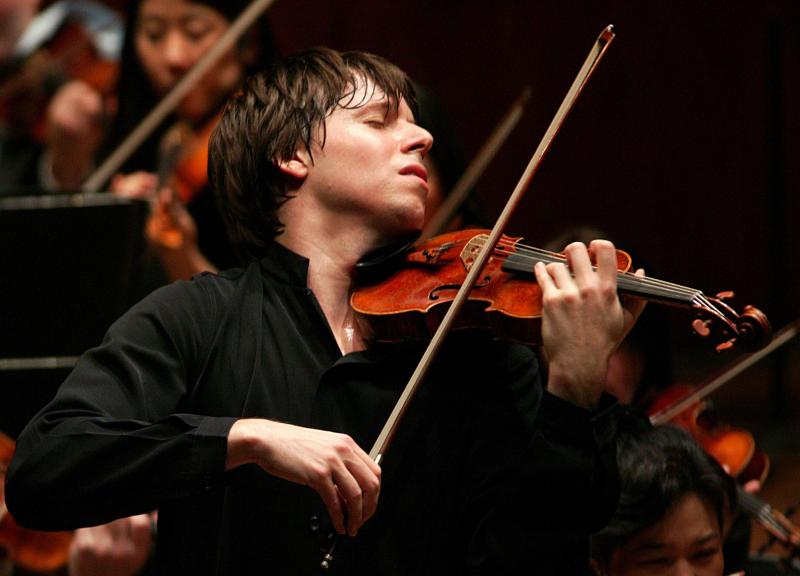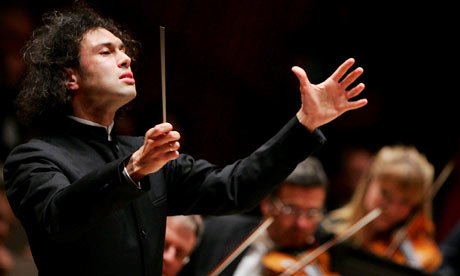Bell, LPO, Jurowski, Royal Festival Hall | reviews, news & interviews
Bell, LPO, Jurowski, Royal Festival Hall
Bell, LPO, Jurowski, Royal Festival Hall
A cabinet of musical curiosities yields some moments of treasure

Despite the best attempts of Stephen Johnson’s programme notes to create synthesis from last night’s London Philharmonic Orchestra concert, there was something rather smash and grab about the programming. It was as though Jurowski, suddenly inspired to play classical Supermarket Sweep, had emerged with a disparate trolley-load of Zemlinsky, Mozart and Szymanowski – oh, and the Brahms Violin Concerto.
The Brahms concerto – the evening’s headline act – was, however, much the most uneven performance of the night, and despite the obligatory cheers and endless bows I was left impressed, but emotionally rather underwhelmed. In Bell’s interpretation it is the Adagio that sets the keynote of the concerto. Although ardent, showcasing Bell’s sweetest tone, this middle movement had a determined intimacy about it; passions were turned inwards, and even in the opening dialogue with the oboe Bell seemed reluctant to reach out. Physical gestures were big, but the sound rarely matched them, and it was only with Bell absent from the texture that Jurowski’s orchestra were able to swell to full force and momentum.
Zemlinsky’s work tends to bombast, leaving one mourning the composer as Hollywood’s greatest loss
The opening Allegro felt as though it already had the Adagio in its sights, negotiating its way stylishly yet always carefully forwards. Pacing was fine, but temperament seemed more at issue. We were never in any danger of being swept off our feet by the sedate waltz theme, and despite Bell’s ubiquitous portamenti and vibrato I didn’t quite believe the tale of Sturm und Drang he spun from the forte theme.
This was Brahms played for spontaneity, for in-the-moment directness, and what it gained in personality (Bell’s own first-movement cadenza is a thing of folksy charm, whimsical little glimpses of the waltz theme caught through a gauzy curtain of harmonics) it lacked in stature and scope. Nowhere was this plainer than in the concerto’s closing three chords; Jurowski drew impressive emphasis from the LPO, but this only served to emphasise the disjunction between these and the tone of the concerto as a whole. Like vast wrought-iron gates at a country cottage the two simply didn’t belong together.
Despite not being the theatrical curtain-raiser critics have named it, Mozart’s miniature Symphony No 32 in G major did a very good job of opening proceedings. Textures here must match the telescoped developmental structure for clarity, and Jurowski’s none-too-chamber band of musicians managed exactly this, firing off the initial scalic theme with the precision of a gun-salute, before segueing directly into the lingering suspensions of the Andante.
 What relation this opener had to the Orientalist fantasy of Szymanowski’s Symphony No 3 (I’m not quite convinced by the symphony-in-one-movement argument) or the choral tone-poem that is Zemlinsky’s Psalm 23 I’m not sure, but this post-interval set definitely seemed to be the business end of the concert. The London Philharmonic Choir (particularly the upper voices) made a persuasive case for the more bucolic episodes of the latter work, sitting smoothly on the rather self-consciously verdant pastures summoned by Jurowski’s (pictured above) woodwind and harps. Unfortunately Zemlinsky’s passion rather overtakes him, and the work tends to bombast, leaving one mourning the composer as Hollywood’s greatest loss.
What relation this opener had to the Orientalist fantasy of Szymanowski’s Symphony No 3 (I’m not quite convinced by the symphony-in-one-movement argument) or the choral tone-poem that is Zemlinsky’s Psalm 23 I’m not sure, but this post-interval set definitely seemed to be the business end of the concert. The London Philharmonic Choir (particularly the upper voices) made a persuasive case for the more bucolic episodes of the latter work, sitting smoothly on the rather self-consciously verdant pastures summoned by Jurowski’s (pictured above) woodwind and harps. Unfortunately Zemlinsky’s passion rather overtakes him, and the work tends to bombast, leaving one mourning the composer as Hollywood’s greatest loss.
The Szymanowski is an altogether more substantial work, if only in volume. Celesta, piano, harps and organ join an already overgrown orchestra, as well as tenor soloist. Unfortunately such weight of forces in the Royal Festival Hall (now a Proms performance would be well worth hearing) often resulted in a gilded Eastern cacophony, through which soloist Jeremy Ovenden struggled to project. Despite this, and Ovenden’s rather tight account of Rumi’s sensuous poetry, the work’s delight in its own textures is intoxicating, especially when balanced by Jurowski’s precise ear.
A musical sampler rather than a conventional concert, this cabinet of musical curiosities from Jurowski and the LPO was not without its moments of treasure. That these were found in unexpected places – characterful Mozart, unabashed Orientalist excess – perhaps speaks to the dialogic energy Jurowski created by jumbling them all in together. By accident or intelligent design, last night the LPO gave their audience plenty to ponder.
Explore topics
Share this article
The future of Arts Journalism
You can stop theartsdesk.com closing!
We urgently need financing to survive. Our fundraising drive has thus far raised £49,000 but we need to reach £100,000 or we will be forced to close. Please contribute here: https://gofund.me/c3f6033d
And if you can forward this information to anyone who might assist, we’d be grateful.

Subscribe to theartsdesk.com
Thank you for continuing to read our work on theartsdesk.com. For unlimited access to every article in its entirety, including our archive of more than 15,000 pieces, we're asking for £5 per month or £40 per year. We feel it's a very good deal, and hope you do too.
To take a subscription now simply click here.
And if you're looking for that extra gift for a friend or family member, why not treat them to a theartsdesk.com gift subscription?
more Classical music
 Jansen, LSO, Pappano, Barbican review - profound and bracing emotional workouts
Great soloist, conductor and orchestra take Britten and Shostakovich to the edge
Jansen, LSO, Pappano, Barbican review - profound and bracing emotional workouts
Great soloist, conductor and orchestra take Britten and Shostakovich to the edge
 Jakub Hrůša and Friends in Concert, Royal Opera review - fleshcreep in two uneven halves
Bartók kept short, and a sprawling Dvořák choral ballad done as well as it could be
Jakub Hrůša and Friends in Concert, Royal Opera review - fleshcreep in two uneven halves
Bartók kept short, and a sprawling Dvořák choral ballad done as well as it could be
 Hadelich, BBC Philharmonic, Storgårds, Bridgewater Hall, Manchester review - youth, fate and pain
Prokofiev in the hands of a fine violinist has surely never sounded better
Hadelich, BBC Philharmonic, Storgårds, Bridgewater Hall, Manchester review - youth, fate and pain
Prokofiev in the hands of a fine violinist has surely never sounded better
 Monteverdi Choir, ORR, Heras-Casado, St Martin-in-the-Fields review - flames of joy and sorrow
First-rate soloists, choir and orchestra unite in a blazing Mozart Requiem
Monteverdi Choir, ORR, Heras-Casado, St Martin-in-the-Fields review - flames of joy and sorrow
First-rate soloists, choir and orchestra unite in a blazing Mozart Requiem
 Cho, LSO, Pappano, Barbican review - finely-focused stormy weather
Chameleonic Seong-Jin Cho is a match for the fine-tuning of the LSO’s Chief Conductor
Cho, LSO, Pappano, Barbican review - finely-focused stormy weather
Chameleonic Seong-Jin Cho is a match for the fine-tuning of the LSO’s Chief Conductor
 Classical CDs: Shrouds, silhouettes and superstition
Cello concertos, choral collections and a stunning tribute to a contemporary giant
Classical CDs: Shrouds, silhouettes and superstition
Cello concertos, choral collections and a stunning tribute to a contemporary giant
 Appl, Levickis, Wigmore Hall review - fun to the fore in cabaret and show songs
A relaxed evening of light-hearted fare, with the accordion offering unusual colours
Appl, Levickis, Wigmore Hall review - fun to the fore in cabaret and show songs
A relaxed evening of light-hearted fare, with the accordion offering unusual colours
 Lammermuir Festival 2025, Part 2 review - from the soaringly sublime to the zoologically ridiculous
Bigger than ever, and the quality remains astonishingly high
Lammermuir Festival 2025, Part 2 review - from the soaringly sublime to the zoologically ridiculous
Bigger than ever, and the quality remains astonishingly high
 BBC Proms: Ehnes, Sinfonia of London, Wilson review - aspects of love
Sensuous Ravel, and bittersweet Bernstein, on an amorous evening
BBC Proms: Ehnes, Sinfonia of London, Wilson review - aspects of love
Sensuous Ravel, and bittersweet Bernstein, on an amorous evening
 Presteigne Festival 2025 review - new music is centre stage in the Welsh Marches
Music by 30 living composers, with Eleanor Alberga topping the bill
Presteigne Festival 2025 review - new music is centre stage in the Welsh Marches
Music by 30 living composers, with Eleanor Alberga topping the bill
 Lammermuir Festival 2025 review - music with soul from the heart of East Lothian
Baroque splendour, and chamber-ensemble drama, amid history-haunted lands
Lammermuir Festival 2025 review - music with soul from the heart of East Lothian
Baroque splendour, and chamber-ensemble drama, amid history-haunted lands
 BBC Proms: Steinbacher, RPO, Petrenko / Sternath, BBCSO, Oramo review - double-bill mixed bag
Young pianist shines in Grieg but Bliss’s portentous cantata disappoints
BBC Proms: Steinbacher, RPO, Petrenko / Sternath, BBCSO, Oramo review - double-bill mixed bag
Young pianist shines in Grieg but Bliss’s portentous cantata disappoints

Add comment